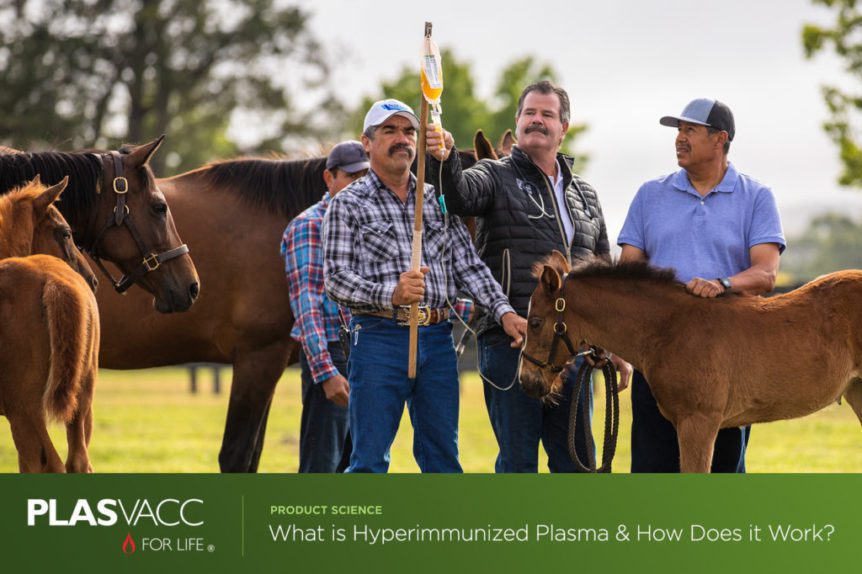At Plasvacc USA Inc., we provide veterinary biological products that help animals live longer, healthier lives. We started Plasvacc out of a passion for horses, dogs, and healthy, happy animals of all kinds. From our facility in beautiful Templeton, California, and our sister ranch in Queensland, Australia, we collect and process Caniplas® and Equiplas® hyperimmunized plasma for the treatment of a variety of canine and equine conditions.
What is Hyperimmunized Plasma?
Plasma is the liquid, cell-free component of mammalian blood. Hyperimmunized plasma contains an increased level of antibodies (immunoglobulin) over untreated plasma. These increased antibodies have been shown to provide greater protection from infections, as well as promote faster healing and recovery times. Plasma supports the animal’s natural immune system, so there are fewer side effects and drug interactions.
Hyperimmunized plasma is used for the prevention and treatment of conditions such as Failure of Passive Transfer (FPT) in foals and Rhodococcus equi infections. Additionally, it can shorten recovery times from other diseases and injuries. Scientific details about the effects of hyperimmune equine plasma can be found here.
Plasvacc USA’s 100% traceable, single source, cell-free plasma is collected exclusively from our donor herd. All Plasvacc’s products are rigorously tested and USDA approved, and we put our Immunoglobulin (IgG) levels on the labels.
Donor Animals
Hyperimmunized plasma can only come from donor animals who adhere to a regimen of testing, vaccinations, and monitoring. Before being accepted into the closed herd, horses are quarantined and screened for suitability as plasma and red cell donors by the Serology Department at the University of California, Davis.
Our donor horses reside on our ranch in Templeton, CA, and come from all different backgrounds including retired quarter horses and racehorses. The animals are meticulously cared for and donate plasma only about once a month.
Our canine donors reside in our facility in Australia, and like their equine counterparts, are screened, tested, and hyperimmunized for a variety of specific diseases, such as Parvovirus. Every Plasvacc donor animal is tended to by veterinary professionals who love what they do.
Collection Process
Plasma is collected by Plasvacc’s Pheresis Technicians, who know and care about the donor animals. During collections, the donors also receive replacement IV fluids so the animals are ready to rejoin the herd setting right after collection, without feeling sick or dehydrated.
Plasvacc’s plasma products are quality control tested immediately after collection, and only sold once approval from the USDA is received.
Benefits and results
Hyperimmunized plasma has shown efficacy for a variety of illnesses and injuries. In dogs, Caniplas plasma can help minimize treatment times, shorten hospital stays, and require fewer medications. Canine Parvovirus cases have seen faster recovery times with plasma treatments because they supplement the dog’s natural immune response, allowing the animal more time to fight the infection.
In horses, hyperimmunized plasma has several applications. Since foals are born with few antibodies, they need the benefits of IgG provided by the mother’s colostrum. When antibodies cannot be passed through the colostrum, the foal can suffer from Failure of Passive Transfer (FPT), which can be fatal. Equiplas provides the necessary IgG antibodies to help every foal reach its full potential.
Complete failure of passive transfer in foals is defined as an IgG level of less than 400 mg/dL, and partial failure is an IgG level of between 400-800 mg/dL, 24 hours after birth. Administering one unit of plasma at birth can provide the foal with a strong, healthy immune system to give it the best start in life.
In addition to FPT treatment in foals, Equiplas has been used to treat Rhodococcus, West Nile virus, and other serious infections. Read more about how plasma therapy can benefit horses here.
“Years ago, we would see the clinic full of cases of Rhodococcus, foals one right after another … and now most of the farms in the area use [Equiplas], and we just don’t see it anymore.”
– Ed Hamer, DVM.
To learn more about hyperimmunized plasma, Equiplas and Caniplas, please visit the Scientific Papers section of the website. And if you have questions or would like more information on any of our products, feel free to contact us.

